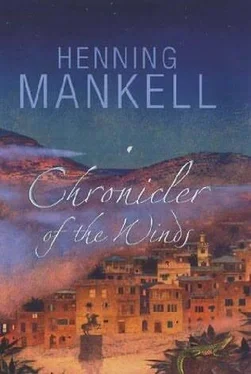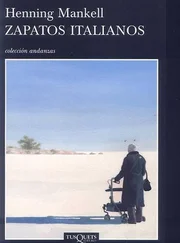I, José Antonio Maria Vaz, came to Dona Esmeralda as soon as the rumour spread through the city that she was going to open a bakery. At that time I was working for the baker Felisberto in the harbour district, and I had no thoughts of quitting. And yet, one afternoon after work, I couldn't resist going over to see Dona Esmeralda, who was just then hiring bakers. A long queue wound its way out of the side door of the theatre. I went to the end of the line, even though I knew it was pointless. But I couldn't resist the temptation to stop and, for once in my life, come close to the strange Dona Esmeralda. When it was finally my turn, I was admitted and led into a room where the sparkling stainless-steel dough blender stood waiting to begin its work. Dona Esmeralda was sitting on a low stool in the middle of the room, wearing a long silken gown and a wide-brimmed, flower-patterned hat. She gave me a solemn look. There was something inquisitive about her glance, as if she were asking herself whether she had met me before. Then she nodded abruptly, as if she had made an important decision.
'You look like a baker,' she said. 'Do you have a name?'
'José Antonio Maria Vaz,' I told her. 'I've been baking bread since I was six years old.'
I told her where I was working, but I wasn't sure whether she heard what I said.
'How much is Felisberto paying you?' she interrupted me.
'I earn 130,000,' I said.
'I'll give you 129,000,' she replied. 'If you really want to work here, you'll make do with less than what you're getting from Felisberto.'
I nodded, and so I was hired. That was more than five years ago, but I can still vividly recall the moment. Dona Esmeralda asked me to get started at once. She wanted me to help her with the plans to buy flour and sugar and yeast and butter and eggs. During those long days and nights when we worked together before the bakery opened, she told me about her life. That's how I know all that I know about her. It was through her that I began to understand something about the city in which I live, and about the country that is mine.
Whether Dona Esmeralda was crazy or not, I can't say. On the other hand, I can certainly attest that she possessed an energy and determination that I had never before encountered. The people around her could collapse with fatigue, just from watching her at work in her theatre and bakery. Although she was then between eighty and ninety years old, she never rested. Many nights she didn't even bother to go home; she would simply curl up on some flour sacks, call goodnight to the bakers, and then get up again after half an hour, bursting with renewed energy, as if she had awakened from a long night's sleep. Sometimes, as we waited for the bread to rise, we would discuss when and what Dona Esmeralda actually ate. She was always scraping off the dough from around the edges of the dough blender with her fingers. No one had ever seen her eat anything else. On the other hand, she always had a bottle of cognac nearby. We suspected that it was from the bottle that she drew the strength she needed, but since we were simple people who had never had either the money or the opportunity to taste foreign distilled drinks, always celebrating instead with tontonto, we used to discuss whether her bottles might also contain something that kept a person young. Maybe Dona Esmeralda had a curandeiro who infused her drinks with magical powers.
When I, José Antonio Maria Vaz, first came to Dona Esmeralda's bakery, which she had named the Holy Bread Bakery, I had just turned eighteen. I was a trained baker, although I was still lacking my master's certificate. But I had been baking bread since I was six years old.
It was my father who took me over to my uncle, Master Fernando, who ran a bakery in the African bairro out past the airport. My father, who all his life long was an extremely impractical man, had one day looked at my hands and decided that they were suited for shaping croissants. I would find both my future and my livelihood as a baker. Like almost all other Africans, we were poor. I grew up during the time when no one had yet heard anything of the young revolutionaries who had already gone across the northern border. No one could possibly imagine that anyone would ever question the power of the whites who ruled our country and our lives, and even less that one day the whites would have to flee head over heels, never to return. For generations we had been forced to bow our heads in submission. Even though I now know that oppression can never become a habit, and even though back then opposition did exist in the silence levelled at all the whites who ruled over our lives, there was still no one except the young revolutionaries who seriously believed that anything could be changed. On many occasions, and when he was certain that no white person could hear what he said, my father, who spent his long life talking incessantly, would curse those who had come across the sea and forced us to work on their tea plantations and in their fruit orchards. But it was a protest that tied itself into complicated knots and never led to anything but more words.
For forty years my father sat under a tree in the open area among the sheds and hovels of the bairro. He sat in the shade and talked with the other unemployed men while he waited for the food to be ready which my mother prepared over an open fire. He talked without stopping for all those years; my mother listened with resignation and never with more than half an ear to what he said, and yet I think it was his beautiful voice that had once made her fall in love with him. They had eleven children; I was the eighth, and seven of us grew up and outlived both our parents. My father, Zeca Antonio, came originally to the city from one of the remote western provinces, and he always talked about how he would one day take his family back there. He met my mother, Graça, almost as soon as he arrived in the city. She was born here, and she was enchanted by all his words. They built their shabby hut in the bairro that had sprung up in connection with the construction of the new airport. Neither of them could read or write, and of us children, only one of my sisters and I ever learned to handle spelling and words.
It wasn't until later, after the young revolutionaries had come to the city and Dom Joaquim's equestrian statues were toppled from their pedestals, that people became truly incensed. As if they saw for the first time the centuries-old injustices to which they had been subjected; and they assumed that the liberation, the freedom that the young revolutionaries talked about, meant the freedom not to work. When they realised that freedom meant they would have to work just as hard, but now they would also have to think for themselves and plan the work that had to be carried out, there were many people who deep in their souls felt thoroughly bewildered. Several years after the whites had disappeared back across the sea, I often heard my father complain about the actions of the young revolutionaries just as quietly as he had once criticised the conditions of the colonial period. And in all seriousness he would express longings for the good old days, when there was law and order and the whites still decided what thoughts needed to be thought. It was a confusing time, when we suddenly had to stop saying patrão and call everyone camarada instead. It was a time when everything was supposed to change, but everything stayed the same, only in a different way.
That was also when the long civil war broke out. The young revolutionaries, who had become middle-aged and rode around in black Mercedes escorted by the shrill sirens of motorcycle police, called the others in the war bandidos armados. From what we could understand, it was the whites who had fled and now dreamed of returning who stood behind them. They had formed a bandit army of malcontent blacks. One day they would return and put Dom Joaquim's statues back in the plazas, they would retake power and decide what thoughts people should think, and the middle-aged revolutionaries would be forced once more to cross the northern border. In the name of these whites, the bandits committed terrifying acts, and we all harboured a great fear that they would win the war.
Читать дальше












